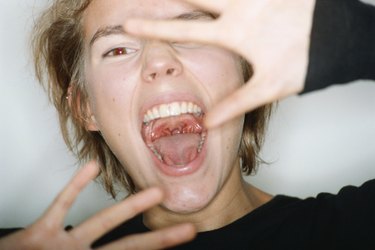
The roof of your mouth is a particularly sensitive area. The tiniest abnormality may feel huge when your tongue swipes at it on your palate. Soreness on the roof of your mouth after you eat can stem from a variety of possible causes. Visit your doctor or dentist if your mouth pain lingers.
Burns
Video of the Day
Burning the roof of your mouth while eating can cause significant soreness afterward, sometimes for several days. Your palate is delicate. The high internal temperatures of coffee and other hot beverages, melted cheese on pizza, enchiladas or other similar dishes can burn your palate easily, even if you take small bites or sips. The simple solution to this problem is to prevent burns on the roof of your mouth by allowing your food to cool before eating. Lift the cheese layer up away from the rest of the food to let steam escape before taking a bite.
Video of the Day
Cold Sores
Cold sores, otherwise known as fever blisters, may be the cause of your pain. Cold sores on the roof of your mouth might hurt at other times of the day as well, but the pain can increase when you eat. The pressure of the food against your mouth can contribute to discomfort, and the specific foods you eat might irritate the lining of your palate around the sore as well. Spicy and acidic foods may be more likely to make your mouth hurt when you have a fever blister on your palate.
Burning Mouth Syndrome
The roof of your mouth may become sore after eating -- especially meals consumed later in the day -- if you have burning mouth syndrome. As the name suggests, the primary symptom of burning mouth syndrome is a burning sensation in your mouth and on your tongue. Your mouth may also feel sore and become dry. Symptoms often increase throughout the day and recede while you sleep at night. The timing of the increase in pain may coincide with lunch or dinner as the day progresses and you could experience excessive soreness after these mealtimes.
Dietary Adjustments
Regardless of the cause of your sore palate, the adjustments you make to your diet may minimize symptoms. Foods that are very acidic, such as tomatoes and tomato-based sauces, citrus fruits and carbonated soft drinks, and spicy foods such as salsa, chili, curry and jalapeno seasonings can make your symptoms intensify. Stick to a bland diet when you experience soreness in the roof of your mouth. Eating ice chips or ice pops may help you feel better.